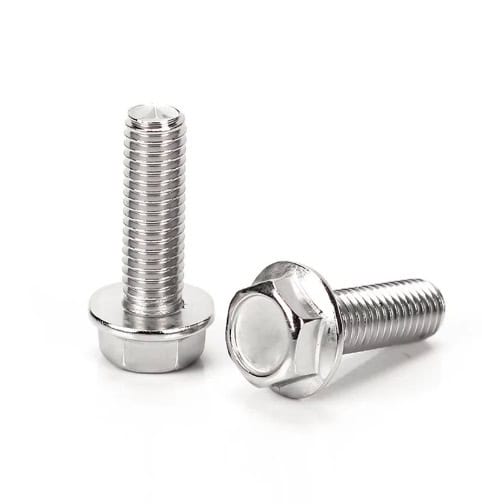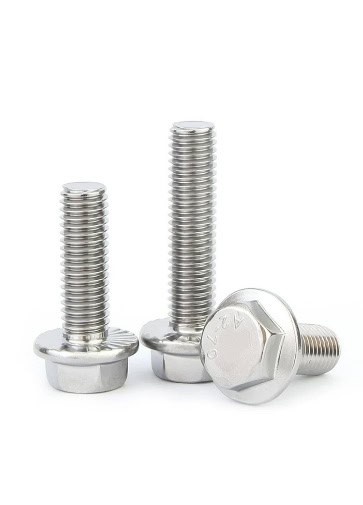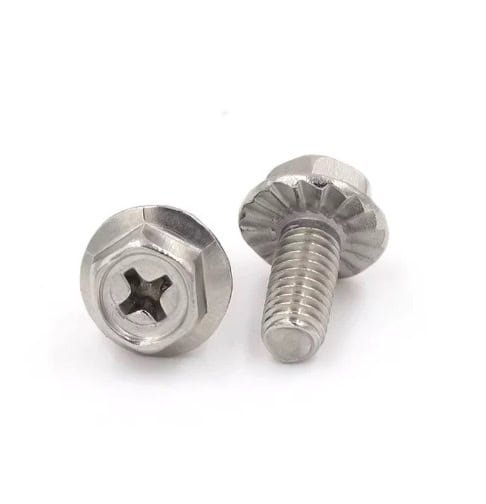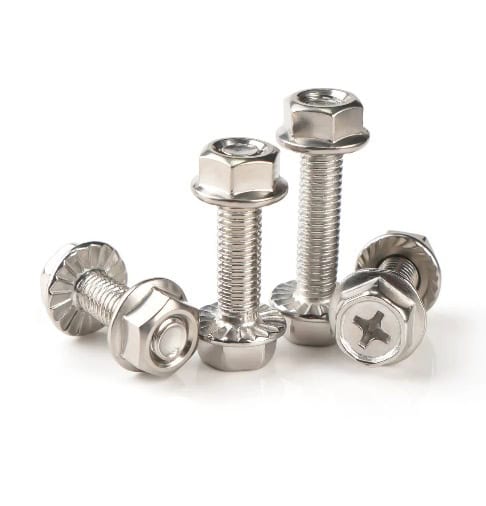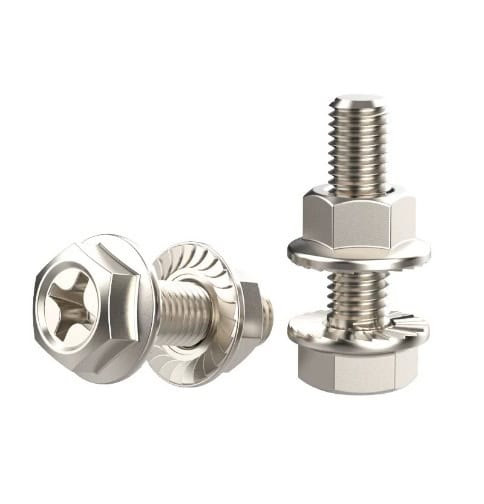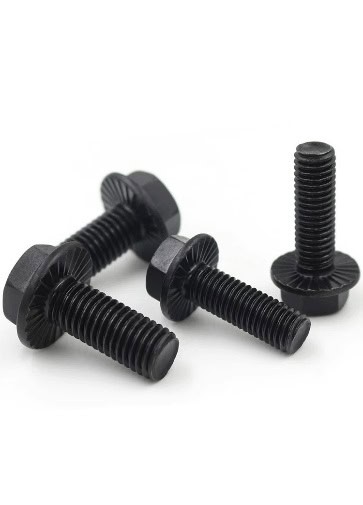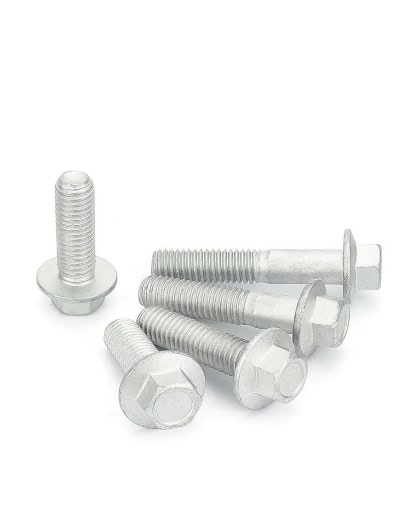Flange screws
Flange screws (also known as hex flange bolts) are a type of fastener with a hexagonal head and an integrated washer-like flange. This built-in flange under the head spreads the clamping force over a larger area, providing superior load distribution and vibration resistance compared to standard hex screws. Flange screws and rail fastening bolts are manufactured in a variety of materials and sizes to meet international standards, making them popular in industries ranging from automotive and machinery to railway systems, construction, and electronics.
Home - Flange screws
Functions and Benefits
Integrated Washer Design: The wide flange under the head acts as a built-in washer, eliminating the need for a separate flat washer. This one-piece design simplifies component counts and ensures the washer is always in place, resulting in more consistent assemblies. The integration not only reduces inventory of extra washers but also means one less piece that could be lost or misaligned during installation. In applications such as rail fastening bolts, this integrated washer design provides enhanced stability and durability under heavy vibration and dynamic loads, ensuring secure and long-lasting rail connections.
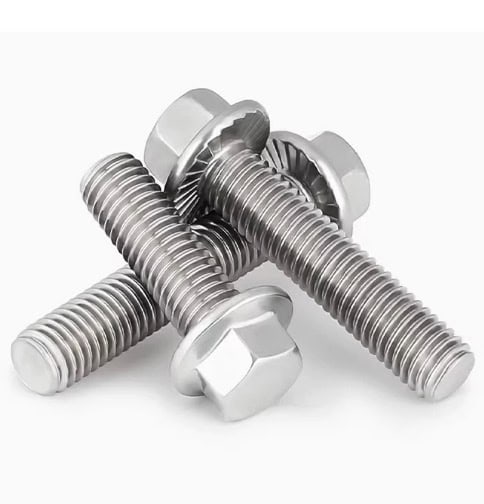
Typical Product Variants
| Variant (Standard) | Material & Grade | Size Range | Key Features / Notes |
rail fastening bolts Metric Hex Flange Screw (DIN 6921) – Regular flange head, often serrated | Carbon steel (Class 8.8, 10.9) (Stainless steel also available) | M6–M16 (up to M20 for larger applications) | Integrated washer face; available with smooth or serrated flange. Conforms to DIN 6921 (common European standard for hex flange bolts). Suitable for automotive and machinery. |
| Metric Hex Flange Screw (JIS B1189) – Small flange head (Japanese standard) | Carbon steel (Class 10.9) | M6–M12 (typical range) | Smaller flange diameter profile per JIS B1189 standard (often used in Japanese vehicles). Usually supplied in high-tensile Grade 10.9 with coarse metric threads. Serrated versions common for automotive use. |
| Stainless Steel Flange Screw – Corrosion-resistant grade | Stainless steel A2 (304) – 70, A4 (316) – 80 (equivalent to Class 70/80) | M6–M16 | Resists rust in outdoor or marine environments. Typically with smooth, non-serrated flanges (serrations are less common on stainless due to hardness). Meets DIN/ISO standards in dimensions. Ideal for applications requiring corrosion resistance and non-magnetic properties. |
| Inch Hex Flange Bolt (SAE) – UNC/UNF threads, Grade 5/8 | Carbon steel (SAE Grade 5, Grade 8) | 1/4″–3/4″ diameter (common); lengths 1″ and up | U.S. standard flange bolts per ANSI/ASME specs (ASME B18.2.2). Supplied in inch series with UNC or UNF threads. Grade 5 and Grade 8 correspond to medium and high strength. Often used in American automotive and equipment assemblies, available in serrated or smooth bearing faces. |
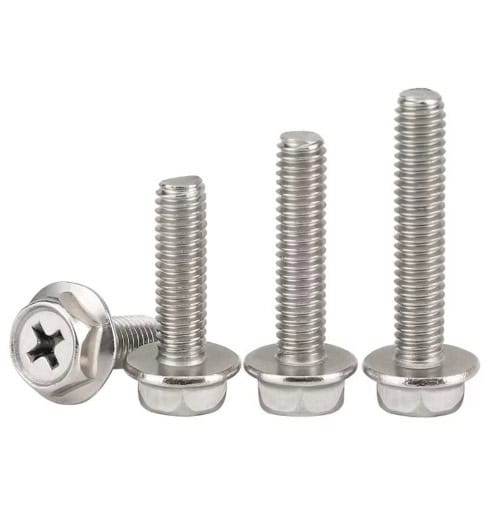
Increased Load Distribution:
The flange provides a significantly larger bearing surface compared to a standard bolt head, spreading the clamping force over a broader area This even load distribution prevents damage to the mating surface and reduces the risk of embedding or crushing softer materials. By dispersing pressure, flange screws protect joint surfaces and maintain a more secure hold under stress
Functions and Benefits
- Flange screws offer several structural and mechanical advantages over conventional bolts and separate washers: Integrated Washer Design: The wide flange under the head acts as a built-in washer, eliminating the need for a separate flat washer
Typical products
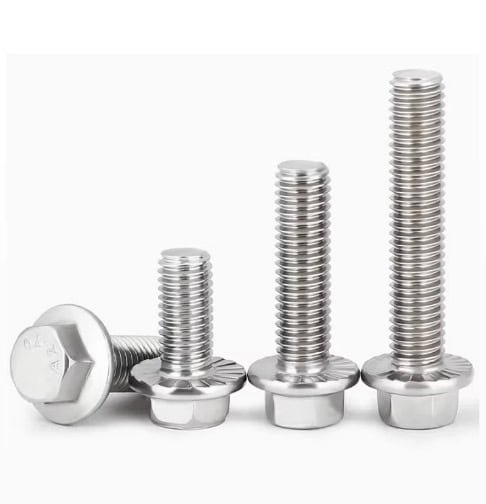
304 stainless steel small head hexagon flange bolts GB5787 with teeth and pads for anti-slip and anti-loosening bolts M6-M16
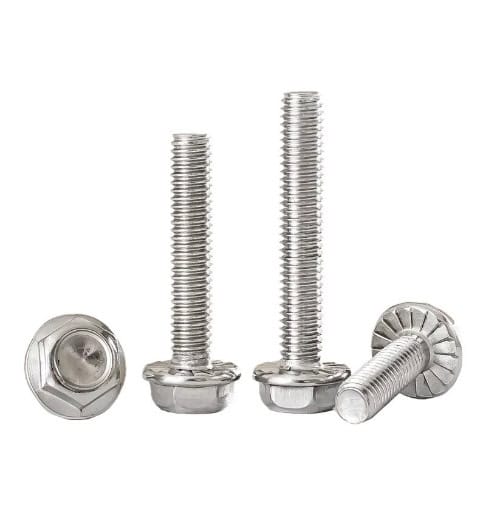
304 stainless steel hexagon flange screw with washer concave flat bottom anti-slip bolt M4-M12
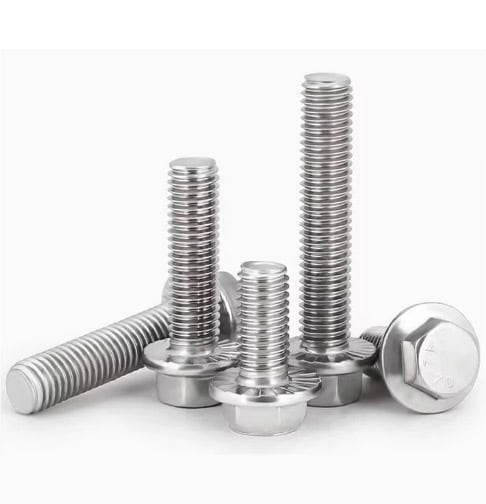
304 stainless steel hexagonal flange screws with teeth and pads for non-slip and anti-loosening bolts M4-M12
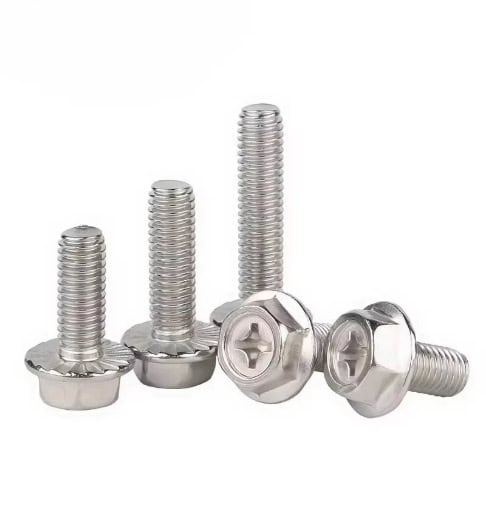
304 stainless steel cross hexagon flange screws without teeth/with teeth and pads, anti-slip and anti-loosening bolts M3-M8
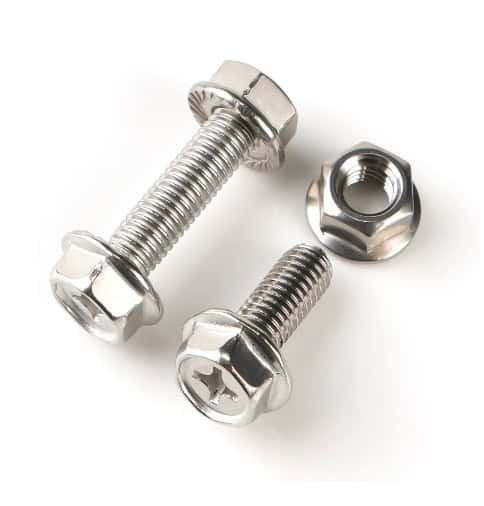
304 stainless steel cross hexagon flange screw and nut combination set with toothed washer bolts M3-M8
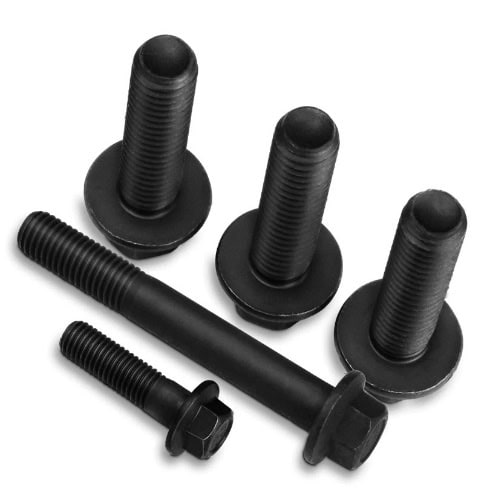
10.9 grade alloy steel hexagon flange bolts, black, non-toothed/toothed with washer bolts M6-M16
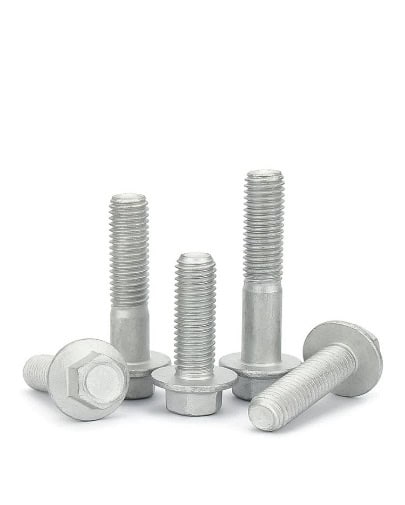
10.9 grade hexagon flange screws Dacromet bolts with washers M6-M16
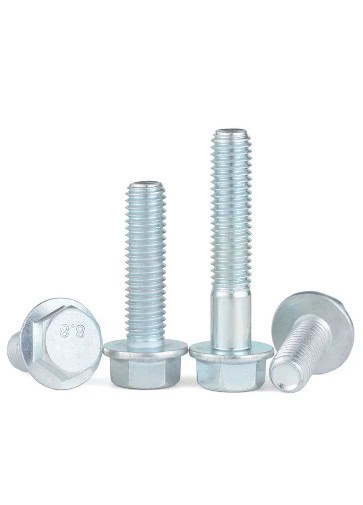
8.8 grade galvanized hexagon flange bolts with washers M5-M12
Applications and Use Cases

rail fastening bolts Used extensively in car, truck, and heavy equipment assembly to secure critical components. For example, flange screws are found in engine mounting, transmission assemblies, and suspension systems where resistance to vibration and loosening is essential
The integrated flange ensures these fasteners stay tight under engine vibration, making them ideal for chassis and powertrain connections.
Industrial Machinery: Employed in manufacturing equipment, machinery,

Found in appliances, electronic devices, and electrical panels where secure fastening is needed in compact spaces. Small flange screws (often M3–M6) secure components like circuit boards, casings, or cable clamps, benefiting from the built-in washer to spread load on delicate parts. In devices exposed to motion or vibration (for instance, automotive electronics or industrial control boxes), serrated flange screws are chosen to prevent loosening over time
Their vibration-resistant design helps maintain electrical connections and mechanical integrity in sensitive equipment.
Essential Guide to Choosing the Best Flange Screws for Your Projects
Introduction to Flange Screws
Flange screws are ideal for various applications, including wood and heavy industrial use, with features like self-tapping thread and vibration resistance. Flange screws are often required in heavy-duty construction and manufacturing because their self-locking design, vibration resistance, and ease of installation without washers make them especially suitable for industrial applications.
They come in different head types, such as flange head, and drive types, including self-tapping screws, to suit specific needs.
Understanding the basics of flange screws is crucial for selecting the right type for your project, considering factors like torque and resistance.
Flange screws can be used with or without a washer, depending on the application, and are available in various materials and finishes, including zinc plated.
Types of Screws
- Self-tapping screws are a popular choice for their ease of use and ability to cut into materials like wood without pre-drilling.
- Head self-tapping screws offer a secure hold and are suitable for a range of applications, from roofing to heavy woodwork.
- Flange screws with a serrated head provide additional vibration resistance, making them ideal for industrial use.
- The choice of screw type depends on the specific requirements of the project, including the type of material and the desired level of resistance.

Materials and Zinc Plated Finishes
- Flange screws are available in various materials, including stainless steel and high tensile steel, to suit different environments and applications.
- Zinc-plated finishes offer excellent corrosion resistance, making them suitable for outdoor use and applications where exposure to moisture is a concern.
- The choice of material and finish depends on the specific needs of the project, including factors like durability and resistance to corrosion.
- Considering the environment and application is crucial when selecting the material and finish of the flange screw.
Thread Types and Sizes
Selecting the right thread type and size is essential when choosing flange head self-tapping screws for your project. The self-tapping thread is engineered to cut into materials like wood, making screwing quick and efficient without the need for pre-drilling. This feature not only saves time but also ensures a strong, secure hold, ideal for a wide range of applications.
Our extensive range of flange head self-tapping screws includes options with both coarse and fine threads, each designed to deliver optimal torque and resistance depending on your requirements. For example, zinc plated screws are particularly popular for their corrosion resistance, making them ideal for woodwork and outdoor projects where durability is key.
You’ll find a variety of thread sizes in our stock, including M5, M6, M8, M10, M12, as well as UNF and UNC options, ensuring you can select the perfect screw for any job—whether you need a longer screw for heavy-duty applications or a shorter one for more precise tasks. Each product listing provides detailed information, so you can easily view specifications, compare head types and drive types, and add the right items to your basket. All prices are shown inc VAT for your convenience, and you can purchase in box or pack quantities to suit your needs.
To streamline your selection process, our website features filters that help you narrow down results by thread size, head type, drive type, and finish. You can save time by browsing our organized results page, where you’ll find comprehensive product information and the option to download a PDF for offline reference. If you need further assistance, our services team is always available to provide expert advice and ensure you get the ideal flange screw for your project.
With a wide range of products in stock and fast delivery, you can trust that you’ll find the right flange head self-tapping screws to meet your requirements. Whether you’re working on wood construction, industrial assembly, or any other application, our selection is designed to deliver the performance and reliability you need.
Drive Systems and Flange Head Designs
- Drive systems, such as torque drive, are designed to provide a secure hold and make screwing easier and more efficient.
- Head designs, including flange head and pan head, offer different benefits and are suited to specific applications and materials.
- The choice of drive system and head design depends on the specific needs of the project, including factors like ease of use and level of resistance.
- Considering the drive system and head design is crucial when selecting the right flange screw for your application.
Applications and Uses
- Flange screws are suitable for a range of applications, including wood, metal, and plastic, and are ideal for roofing, wall constructions, and heavy woodwork.
- They are also used in industrial settings, where vibration resistance and a secure hold are essential.
- The versatility of flange screws makes them a popular choice for various projects, from DIY to industrial applications.
- Understanding the different applications and uses of flange screws is essential for selecting the right type for your project.
Benefits and Advantages
- Flange screws offer a range of benefits, including ease of use, a secure hold, and vibration resistance, making them a popular choice for various applications.
- They are also available in a range of materials and finishes, offering versatility and durability.
- The advantages of flange screws include their ability to cut into materials without pre-drilling, making them a time-saving option for many projects.
- Considering the benefits and advantages of flange screws is crucial when selecting the right type for your project.
Selection Criteria and Considerations
- When selecting flange screws, consider factors like material, finish, thread type, and head design to ensure the right screw for your project.
- Think about the application, environment, and desired level of resistance to make an informed decision.
- It’s also essential to consider the drive system and head type, as well as the availability of the screw, including stock and inc vat.
- Viewing product information, including pdf documents and product descriptions, can help you make the right choice.
Conclusion
- Flange screws are a versatile and popular choice for various applications, offering a range of benefits and advantages.
- By considering factors like material, finish, thread type, and head design, you can select the right flange screw for your project.
- Remember to think about the application, environment, and desired level of resistance, and don’t hesitate to view product information and contact services for advice.
- With the right flange screw, you can ensure a secure hold, ease of use, and a professional finish for your project, whether it’s a DIY task or an industrial application.
Contact DingLong
Frequently Asked Questions (FAQ)
Q: What is the minimum order quantity (MOQ) for flange screws?
A: The MOQ can vary depending on the supplier and the specific screw size or material. Many manufacturers have a flexible MOQ for standard sizes – often a few hundred or a few thousand pieces for a bulk order. For custom or non-standard flange screws, the required MOQ might be higher. It’s best to inquire with the supplier; many are willing to negotiate or provide small trial orders for new customers.
Q: What is the typical lead time for an order of flange screws?
A: Lead time depends on order quantity and whether the items are standard or custom. For in-stock standard sizes or finishes, orders can often ship within 1-2 weeks. For production orders, a typical manufacturing lead time is around 4–6 weeks from order confirmation to completion. Complex custom orders or large volumes may take a bit longer. Always check with the manufacturer – many can accommodate urgent requests or have expedited production for an additional cost.
Q: What materials are available for flange screws?
A: Flange screws come in a range of materials. Common options are carbon steel (in various strength grades such as 4.8, 8.8, 10.9, 12.9) and stainless steel (for example A2-70 which is 304 stainless, or A4-80 which is 316 stainless). Alloy steel is used for high-tensile grades, sometimes with heat treatment for extra strength. Some suppliers can also provide flange screws in brass, aluminum, or even titanium for special applications. The choice of material will affect the strength and corrosion resistance, so suppliers will help recommend the appropriate grade for your needs.
Q: Do you offer different coatings or finishes on flange screws?
A: Yes, manufacturers typically offer a variety of surface finishes. The most common is zinc plating (electroplated zinc in clear, blue, or yellow) which provides basic rust protection for indoor and general use. Other available finishes include black oxide (for a black appearance and mild corrosion resistance), hot-dip galvanizing (thicker zinc coating for heavy corrosion protection, often used for construction), nickel plating, chrome plating, and phosphate coatings. If you require a specific coating (for example, chrome-free or RoHS-compliant plating), you can request it when ordering. Finishes can be chosen based on the required corrosion resistance or appearance.
Q: What certifications do you have or provide for these screws?
A: Reputable suppliers will have quality certifications and can provide documentation for their products. Most fastener manufacturers are ISO 9001 certified for quality management. They can also typically supply material test reports and compliance certifications with each batch (for example, EN 10204 type 3.1 certificates, if requested). Flange screws are made to international standards (such as DIN, ISO, JIS, ANSI specifications), and manufacturers can certify that the screws meet these standards. Additionally, coatings can be RoHS compliant (free of hazardous substances like hexavalent chromium). Always ask the supplier for the specific certifications you need – for critical applications, they may also offer PPAP, ISO 14001, or other industry-specific certifications.
Q: How are flange screws packaged for shipping?
A: Typically, flange screws are packed in bulk cartons or boxes suitable for their size and weight. For example, smaller screws might be packed in boxes of 200–500 pcs, whereas larger bolts might be 50–100 pcs per box, ensuring the weight is manageable. These boxes are then sealed and placed in corrugated cartons or on wooden pallets for large shipments. Packaging usually includes clear labeling with the part description, size, lot number, and quantity. If you have special packaging requirements – such as individual poly bags, small retail packs, or custom labels with your branding – many suppliers can accommodate that as part of an OEM service. Proper packaging is important to prevent corrosion or damage in transit, so fasteners may also be lightly oiled or include desiccant packs when shipped in sea freight containers.
Q: Can you produce custom or OEM flange screws?
A: Yes. Most industrial fastener manufacturers offer OEM services and can produce flange screws to custom specifications. If you need non-standard dimensions, special head designs, or specific materials/coatings, you can provide the supplier with drawings or samples. They will evaluate the feasibility and may make a custom production run for you. OEM production often involves a tooling setup, so the lead time might be a bit longer and an MOQ will apply for custom designs. Manufacturers can also provide custom branding (e.g. head markings with your logo) or custom packaging if required. It’s recommended to discuss your exact requirements with the supplier’s engineering team – they can advise on design, strength, and cost considerations for custom flange screws.

